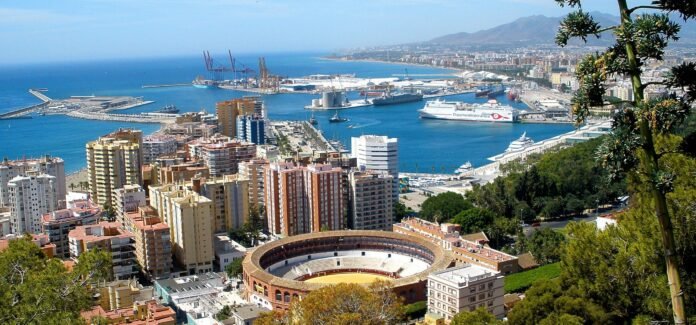Malaga, the crown jewel of Spain’s sunny Costa del Sol, is facing a crisis that threatens its idyllic imagey. Residents are increasingly dissatisfied with the expanding tourist invasion. While good for the local economy, this rise is changing their lifestyle.
A City Divided: From Idyllic Escape to Frustration
The discontent is evident in protest stickers on buildings, especially tourist residences. These candid remarks, from “A family used to live here” to “Stinks of tourists,” show the seething resentment.
Mass tourism’s perceived negative effects are the issue. Although economic benefits are apparent, residents bear the brunt. Rising rental prices and a lack of affordable housing are caused by tourists. Short-term rentals are forcing long-term residents like bar owner Dani Drunko out of his decade-long home.
Many suffer like Drunko. The city’s passivity and lack of regulation are highlighted, “We don’t hate tourists, but we oppose being evicted to make way for tourist apartments.” Local legislator Dani Perez laments the near-impossibility of obtaining a home building without tourist rents. “The mayor isn’t doing anything for the people who live here,” he says.
A Fine Balance: Tourism vs. Local Needs
It’s not black and white. Lawyer Juan Luis Gomez says criticizing tourism is counterproductive. Tourism is vital to the local economy, thus proper control is preferable to rejection.
Malaga faces a turning point. Tourism is vital, but unregulated, it can displace inhabitants and damage the local character that draws visitors. Balance between a strong tourist sector and resident well-being is the key difficulty. Malaga’s officials are under pressure to tighten laws and prioritize year-round residents.
Finding Common Ground: Sustainable Future Solutions
What can be done? Malaga could use these solutions to handle this complicated situation:
- Tourist Rental Regulation: Stricter short-term rental laws could reduce residential conversion and improve housing possibilities. This could mean limiting district tourist rentals or requiring minimum leases.
- Affordable Housing: Investing more in resident-targeted affordable housing could reduce rent-related displacement. This would give long-term inhabitants stable housing.
- Promoting Sustainable Tourism: Sustainable tourism could help residents and the local economy. This may mean enticing longer-stay visitors who give more to the community and explore the city beyond tourist areas. Promoting eco-friendly techniques and cultural immersion would improve visitor experiences and encourage appreciation for local culture.
- Community Engagement: Residents, local officials, and tourist stakeholders must communicate to create a solution that meets everyone’s needs. Public forums and workshops can foster healthy dialogue and collaboration.
Local Story, Global Problem
Malaga is not alone in mass tourism issues. Cities from Venice to Barcelona face comparable difficulties. The lessons from Malaga show the significance of responsible tourism management. Malaga can secure a sustainable future by prioritizing resident well-being and tourism growth.
Despite their frustration, people want a solution that benefits locals and visitors. Whether Malaga can negotiate this hard route and become a responsible tourism model city is unknown. One thing is certain: the discourse has begun, and Malaga’s future depends on finding a response that preserves its beauty and uniqueness for future generations.
Future Malaga: A City in Transition
Innovating Without Regulation
Malaga can overcome mass tourism difficulties with imaginative solutions outside regulations. Some options:
- Smart City Initiatives: Managing tourist flows with technology improves visitor experiences and minimizes resident inconvenience. Smart parking systems, digital information kiosks, and real-time crowd control can improve everyone’s experience.
- Spreading the Wealth: Tourist hotspots can worsen effects. Creating alternative attractions and experiences in less-known neighborhoods helps spread tourist spending and rejuvenate them. This would reduce congestion in popular places and let visitors enjoy true Malaga.
- Responsible Tourism: Teaching tourists about responsible behavior can help them respect the local community and environment. Campaigns, ethical travel guides, and local business collaborations can promote sustainability and reduce negative impacts.
Future Collaboration
Malaga needs cooperation to succeed. Residents, local governments, tourist stakeholders, and visitors all contribute. Success requires open communication, compromise, and a common future vision. Malaga may become a model city for ethical tourism, showing how a thriving tourist sector can coexist with a lively local community.
In conclusion, Malaga faces both challenges and opportunities. The city may regain its picturesque image by understanding residents’ concerns, adopting effective solutions, and embracing innovation. Tourists and residents might dwell peacefully in a future Malaga, adding to its appeal. Whether Malaga achieves this balance is unknown, but the discourse has begun and a solution is desired. The world is watching, and Malaga’s story can help other places with comparable difficulties.



